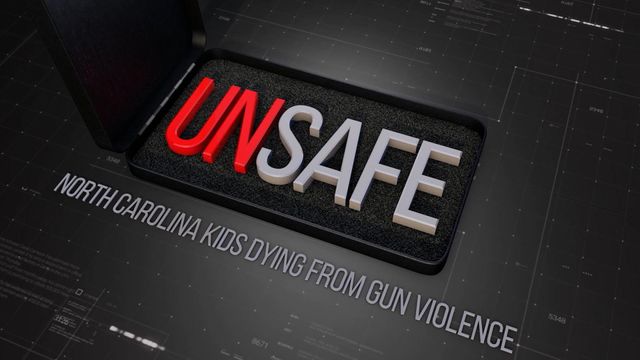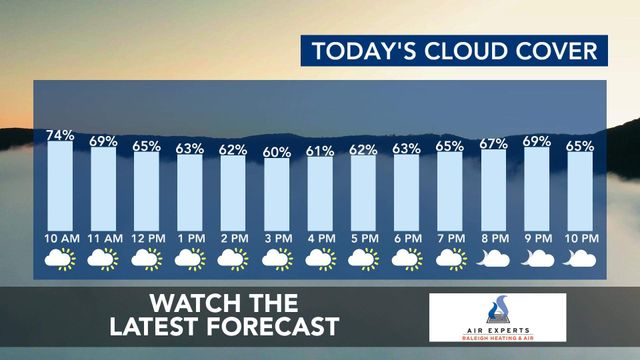Families, gun owners, lawmakers agree on this simple solution to reduce child gun deaths in North Carolina
Guns kill more kids in the U.S. than any other cause. Dr. Henry Rice, a pediatric surgeon with Duke Health knows that all too well.
“I take bullets out of children, sometimes day after day after day," he says.
More children die of gun violence each year in the United States than from cancer; more die from gun violence than in car crashes.
In North Carolina, the problem is worse: Children are 51% more likely to die from guns compared with the national average, according to the North Carolina Department of Public Safety.
What can be done? The argument over guns can be so loud, it drowns out conversation that can yield meaningful change, health professionals and firearm policy experts say.
“I just wish we could take politics out of it,” says Dr. Jeffrey Swanson. He’s a Duke University professor in psychiatry and behavioral sciences studying the interventions, policies and laws that can reduce firearm-related violence and suicide.
It can seem like an intractable political problem, but there is a simple solution – one that families, gun owners and lawmakers of both parties can agree on.
“I do not want to take people's guns away. I want them to keep the guns that they have more safely secured,” says pediatrician Brian H. Eichner.
“Unsecured firearms – that is a huge problem that we have,” says Gerard Tate, director of the Office of Violence Prevention.
Kella Hatcher, executive director of the North Carolina Child Fatality Task Force, a legislative study commission, adds, “Kids know where parents keep their guns, even if parents think they don't know.”
A gun in the hands of a child; a growing problem in North Carolina
On July 25, 2023, Fon Dockery’s 8-year-old daughter Jenesis was shot in the head at the home of her babysitter. She died two days later. As he mourns, he agrees, “If this gun is where it should be, secured in the safe, we are not sitting here today.”
Jenesis is one of hundreds of kids over the last six years in North Carolina who died from gun violence.
600 kids have died since 2017 according to the Division of Juvenile Justice.
Dockery dropped off his daughters at the home of a babysitter, a trusted woman who had cared for them before. He was told that the son of the babysitter – 11 years old at the time – got a gun from the safe of his grandfather and brought it home, where it fell off a shelf and fired, hitting Jenesis in the head.
In a panicked call to 911, the babysitter said, “My son brought … I didn't know my son brought a gun home from my dad's house, and it fell out of the closet, and it shot the little girl that I'm babysitting.”
Dockery doesn’t believe that’s what happened.
“I think he pulled the trigger,” he says of the 11-year-old.
“There's no way that grandfather, as a gun owner, can tell me he believes that a gun fell and went off and the trajectory of that bullet came from falling from the ground. There's no way,” Dockery says.
In 2023, 13% of crimes committed by people under the age of 18 involved a firearm. That’s up from 4% just four years earlier.
A photo and videos on the internet – posted before Jenesis’ death – show the 11-year-old holding a gun.

Dockery believes those images show the 11-year-old had a fascination with guns, one his family knew about and did nothing.
The 11-year-old’s mother says she was unaware of the photos before the shooting, and that her son is holding a BB gun.
Who bears responsibility for 8-year-old Jenesis Dockery’s death?
In the days following Jenesis’ shooting and death, her family searched for answers. Who was to blame?
The 911 call seemed to describe a tragic accident, one that left two families bereft.
“Beyond the actual death of my daughter, that is the most tragic part of this to me and my family,” Dockery said. “That an 8-year-old child's life can be taken and nobody be put into custody – not the babysitter who should have been supervising, not the gun owner who should have been responsible and knew where his gun was and not the shooter himself. Nobody was put in custody.”
Eventually, the Cumberland County sheriff’s office submitted a complaint with the Division of Juvenile Justice alleging two counts of larceny of a firearm and one count of manslaughter were warranted against the 11-year-old. He was in custody until a judge ordered him released to a family member.
The babysitter told WRAL that she did not know the gun was in the house when Dockery dropped off his daughters.
“I would never allow guns at my house,” she said.
Her family, too, is suffering the fallout from gun violence.
“Honestly, it's destroyed me. It's destroyed my family. … My son cries every day. It’s messed him up emotionally too.”
Ultimately, she holds her father accountable for the series of events that resulted in the death of a child.
“My father should have changed the safe code. Period. I don't care if he's 70 years old. I don't care if he's 30 years old. He's a gun owner. He knows to change a code so nobody will know it. … If somebody would've broken his home, they could have figured out the code. I honestly believe it would not have happened if he would've changed his code,” she said.
She knows her son is to blame as well.
“If he never would've put his hands on that gun, this never would've happened. If he would not have went into the gun safe, this wouldn't have happened. He should have been charged with larceny of a firearm because he did,” she says. “He knew better.”
We know what we need to do to reduce child gun deaths
The senseless shooting death of Jenesis Dockery reverberates across two families, a community, and the school she attended.
And there are hundreds of these stories in North Carolina.
Statewide death records show:
- At least 521 North Carolina children have been killed by guns since 2018. That includes accidental deaths, homicides and suicides.
- 15% of them were under the age of 12.
- 42% of all households in the state of North Carolina own firearms.
- 50% of households that own firearms report that they are not safely stored.
- In 2019, juveniles committed more than 1,000 crimes with a gun. In 2023, that number rose to more than 5,000.
“We know we need to focus as a state on this to make sure that we can bring those numbers down,” says William Lassiter, deputy secretary at the state Department of Public Service, where he oversees the Division of Juvenile Justice and Delinquency Prevention.
“I’m not saying that guns are bad," Lassiter said. "What we're trying to say is that bad ownership or not responsible ownership is what's bad.”
Lassiter says children find unsecured guns in homes and in cars.
“In the city of Durham, 60% of the firearms that were stolen by juveniles were stolen from unlocked cars,” he said.
“What we're trying to do is figure out how we limit access – for young people and for criminals – to firearms.”
Many experts in North Carolina say safe storage – keeping guns in a safe or using a gun lock – is one answer.
Hatcher and the North Carolina Child Fatality Task Force have been pushing for a statewide safe storage initiative for years.
“We've been able to find common ground among all sorts of people on this issue and that includes legislators,” she says.
In 2023, lawmakers approved a two-year safe storage awareness campaign, but they did not allot any funding for it.
The state Department of Public Safety found federal dollars to launch the NC S.A.F.E. campaign (Secure All Firearms Effectively). So far, they’ve given out tens of thousands of gun locks and hundreds of gun safes.
“We are working with a lot of the typical gun rights groups across the state of North Carolina on this campaign and a lot of the shooting ranges across the state,” Lassiter said. “The audience we're trying to reach are gun owners. It doesn't do me any good to talk about safe storage with people that don't own a gun.”
In 2024, Lassiter says, the Department of Public Safety Division of Juvenile Justice will ask for about $2.5 million to buy more gun locks, more gun safes and to keep up safe storage messaging.
Gun safety is a message that the pediatrician, Eichner, delivers along with free gun locks to parents of his patients.
“In the 17 years I've been doing this, I've only had one family really question me why I was asking.”
His answer: Because firearms are the leading cause of death among young people.
In part, Eichner says, that is because the rate of gun violence is rising. “It is also due to the fact that we've had successes in decreasing deaths from motor vehicle accidents.”
Health policy experts say when it comes to preventing gun deaths, there are lessons to be learned by the interventions made to motor vehicles in the United States to save lives.
When car crashes were a leading cause of death, "we didn't take people's cars away," said. Dr. Elizabeth Tilson, state health director and chief medical officer for the North Carolina Department of Health and Human Services. “We didn't tell people they couldn't drive, but we said, ‘How do we make the roads safer? Thinking about guardrails, thinking about lighting, how do we make cars safer?’
“That has resulted in a 70% decrease in death from car crashes since the 1970s. I think we can apply that same model when thinking about firearm violence.”
Proper gun storage is an idea that has political support from both major parties, and from mothers like the babysitter and fathers like Fon Dockery.
“Jenesis Dockery is a reason that safe gun ownership is required,” he father says.
Her babysitter says, “If you get a safe, change the code. Don't leave it the generic code as it comes. Store your ammunition and your guns in separate places.”
Gun safety resources: Get a free gun lock
Learn about how to store your firearms safely at home and on the go, how to talk to your children about gun safety and how to make sure that schools and playdates are a safe environment from NC S.A.F.E.
Download a free gun safety kit or request a free gun lock from Project Child Safe.
The Durham County Gun Safety Program also offers outreach events, best safety practices and free gun locks on request.














